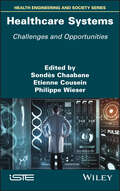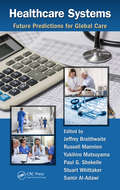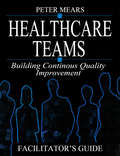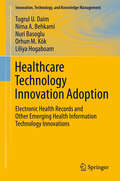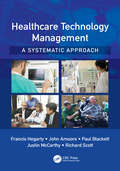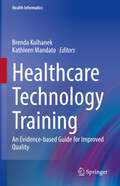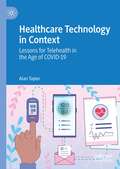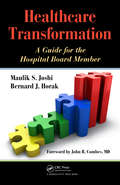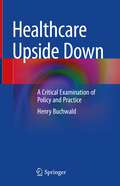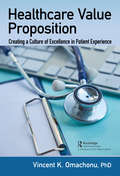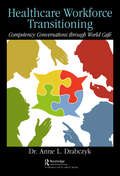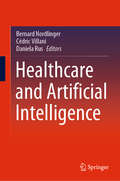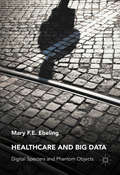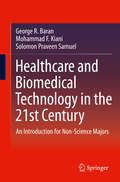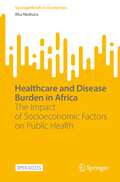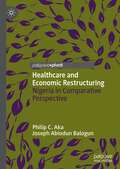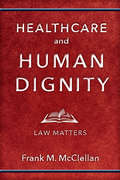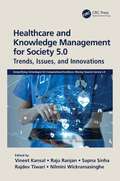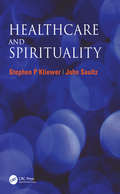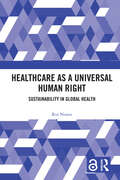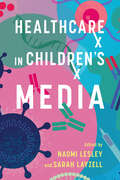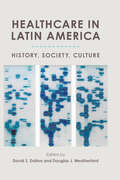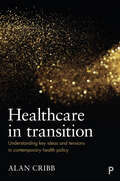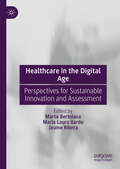- Table View
- List View
Healthcare Systems: Challenges and Opportunities
by Etienne Cousein Philippe Wieser Sondès ChaabaneThis book is centered around the development of agile, high-performing healthcare institutions that are well integrated into their environment. The aim is to take advantage of artificial intelligence, optimization and simulation methods to provide solutions to prevent, anticipate, monitor and follow public health developments in order to intervene at the right time, using tools and resources that are both appropriate and effective.The focus is on the people involved – the patients, as well as medical, technical and administrative staff – in an effort to provide an efficient healthcare and working environment that meets safety, quality and productivity requirements.Heathcare Systems has been written by healthcare professionals, researchers in science and technology as well as in the social sciences and humanities from various French-speaking countries. It explores the challenges and opportunities presented by digital technology in our practices, organizations and management techniques.
Healthcare Systems: Future Predictions for Global Care
by Jeffrey Braithwaite Russell Mannion Yukihiro Matsuyama Stuart Whittaker Samir Al-Adawi Paul G. ShekelleIn this book, we invited 146 authors with expertise in health policy, systems design, management, research, or practice, from each of the countries included, to consider health reforms or systems improvements in their country or region. The resulting case studies, of 52 individual countries and five regional groupings, cover 152 countries or territories, or three-quarters of the world’s nations. Each chapter author was asked to think 5–15 years into the future and make a prediction on how their health system could be strengthened as a result of the successful unfolding of their case study. The types of projects our authors have chosen to explicate into the future are wide-ranging. They vary from e-consultation services in Estonia, achieving universal health coverage in Argentina and Mexico, reforming long-term care in the Netherlands, reassessing care for the aging population and the frail elderly in Australia, streamlining the health system through Lean Thinking in Nigeria, using regulation to improve care in South Africa, developing a new accreditation model in Turkey, through to a critique of physician specialization in Russia and applying IT initiatives to improve care in China, Lebanon, Taiwan, Papua New Guinea, the United Arab Emirates, Venezuela and Wales. Chapter writers recognized that the improvement work they were doing was part of a moving target. There was general agreement that the effective use of limited resources and overcoming hurdles and constraints were crucial to enhancing health systems in order to deliver better care over the medium term. While some initiatives required considerable funding, many were relatively inexpensive. These case studies demonstrate ways in which fruitful application of partnerships and creativity can make considerable gains in strengthening healthcare delivery systems. Features The third book in a series on international health reform Involves 146 contributing authors, five regional editors, a series editor and a highly skilled support team to explore sustainable improvement in health systems in the future Encompasses a time horizon of the next 5–15 years Covers 152 countries or territories, with 52 individual countries and an analysis of five regional groupings comprising 100 countries
Healthcare Teams Manual: Building Continuous Quality Improvement Facilitator's Guide
by Peter MearsThis work provides the reader with an understanding of team building in a health care environment, and shows managers how to build a team that is committed to delivering quality. Topics covered include key quality concepts, team exercises, how to be a team member, team empowerment and continuous quality improvement. The facilitator's guide provides all the lesson plans, overhead projection masters and guides to all the exercises necessary for the team leader or trainer to run a teambuilding workshop.
Healthcare Technology Innovation Adoption
by Nuri Basoglu Tugrul U. Daim Nima A. Behkami Orhun M. Kök Liliya HogaboamThis book aims to study the factors effecting the adoption and diffusion of Health Information Technology (HIT) innovation. It analyses the adoption processes of various tools and applications, particularly Electronic Health Records (EHR), highlighting the impact on various sectors of the healthcare system, such as physicians, administration and patient care, while also identifying the various pitfalls and gaps in the literature. With the various challenges currently facing the United States healthcare system, the study, adoption and diffusion of healthcare technology innovation, particularly HIT, is imperative to achieving national goals. This book is organized into three sections. Section one reviews theories and applications for the diffusion of Health Care Technologies. Section two evaluates EHR technology, including the barriers and enables in adoption and alternative technologies. Finally, section three examines the factors impacting the adoption of EHR systems. This book will be a key source for students, academics, researchers, practitioners, professionals and policy-makers.
Healthcare Technology Management - A Systematic Approach
by Richard Scott Francis Hegarty John Amoore Paul Blackett Justin McCarthyHealthcare Technology Management: A Systematic Approach offers a comprehensive description of a method for providing safe and cost effective healthcare technology management (HTM). The approach is directed to enhancing the value (benefit in relation to cost) of the medical equipment assets of healthcare organizations to best support patients, clinicians and other care providers, as well as financial stakeholders. The authors propose a management model based on interlinked strategic and operational quality cycles which, when fully realized, delivers a comprehensive and transparent methodology for implementing a HTM programme throughout a healthcare organization. The approach proposes that HTM extends beyond managing the technology in isolation to include advancing patient care through supporting the application of the technology. The book shows how to cost effectively manage medical equipment through its full life cycle, from acquisition through operational use to disposal, and to advance care, adding value to the medical equipment assets for the benefit of patients and stakeholders. This book will be of interest to practicing clinical engineers and to students and lecturers, and includes self-directed learning questions and case studies. Clinicians, Chief Executive Officers, Directors of Finance and other hospital managers with responsibility for the governance of medical equipment will also find this book of interest and value. For more information about the book, please visit the website.
Healthcare Technology Training: An Evidence-based Guide for Improved Quality (Health Informatics)
by Brenda Kulhanek Kathleen MandatoThis book is a foundational resource on how to create, implement and maintain a successful healthcare technology training program. It demonstrates the impact of efficient and effective training, and underscores the importance of high-quality content, emphasizing the need to base training on a framework of contemporary learning science to support interactive and relevant training experiences. Details of the latest educational technologies are provided along with instructions on how to implement and maintain appropriate training courses for optimal informatics outcomes.Healthcare Technology Training: An Evidence-based Guide for Improved Quality provides a valuable and comprehensive resource for implementing and maintaining a successful training program by providing a unique all-in-one reference tool with examples and scenarios tailored to informaticians and all healthcare users of technology.
Healthcare Technology in Context: Lessons for Telehealth in the Age of COVID-19
by Alan TaylorThis book investigates how the technology used by telehealth services shapes our healthcare, and how we, as humans, collectively change and shape the technology and services used in healthcare. Based on extensive field research on telehealth services in Australia and Brazil, the book reveals some surprisingly obvious conclusions about our powers to shape the society.
Healthcare Transformation: A Guide for the Hospital Board Member
by Maulik Joshi Bernard HorakDesigned for easy reference, this concise manual provides hospital board members and executives with practical guidance on how to become actively engaged in the transformation of their organization. It focuses on how the healthcare industry as a whole is transforming and stresses the importance of having board members who are knowledgeable and skil
Healthcare Upside Down: A Critical Examination of Policy and Practice
by Henry BuchwaldInspired by witnessing and experiencing the changes in healthcare and its delivery over the past 50 years, Dr. Henry Buchwald observes and comments on the current state of healthcare in the United States. His narrative includes the history, the historical data, and personal experiences of a healthcare system that has moved away from caring, first and foremost, for patients. This expensive, impersonal system, he believes may not be in the best interest either of the nation or of the people it purports to heal.As the title suggests, it appears that healthcare has been turned upside down to serve the administrators of the system and away from its basic function of offering the best care for patients. With this basic principle in mind, the topics presented in this book provide and discuss healthcare statistics and alterations to the language of medicine. The chapters themselves examine the transformations to the medical school, the clinic and the office, the hospital, and the practice. Additional chapters discuss the role of the payers, public health research, as well as pandemics, including COVID-19, the advantages and disadvantages of socialized medicine, as well as the broken doctor/patient relationship. Finally, Dr. Buchwald offers thoughts on the areas in which future healthcare efforts can most fruitfully be expended.Analysing today’s pervading administrative domination of essentially every facet of healthcare, Healthcare Upside Down thoughtfully considers the variety of ways in which we can turn the current healthcare system right-side up to serve those who should be the ultimate beneficiaries – all of us as patients, now and in the future.
Healthcare Using Marine Organisms
by Se-Kwon Kim"The chapters are organized well, and the preface explains how the concept of food is changing over time and how marine organisms are considered as healthy food."—P.N. Sudha, DKM College for Women, Tamil Nadu, India The relationship between food and health has been a growing concern in modern society, and the importance of information on their connection has elevated accordingly. People are becoming prone to diseases due to the deterioration of the environment. Despite a growing interest in preventative medicine in the healthcare sector, few medications can be called preventative drugs. Foods may exhibit completely different functions in a living body, depending on whether their components are simple substances providing energy and nutrition, or valid "functional entities." This book covers all aspects of healthcare solutions through marine-derived materials, with twenty-six chapters exploring an array of topics pertaining to human health in everyday life. Beginning with an introduction to food functionality and disease presentation, Chapters Two to Nine discuss chitin, chitosan, and the production and application of chitosan oligosaccharides regarding anti-cancer, anti-aging, and antioxidant activity. Furthermore, utilization of these cationic polysaccharides in artificial skin development, the prevention of alcohol consumption, dentistry, systemic diseases prevention and Alzheimer dementia are discussed in subsequent chapters. In Chapters Ten and Thirteen, I discuss obesity, osteoporosis, sexual dysfunction and sleep disorders using fisheries products. Additionally, Chapters Fourteen to Eighteen detail the use of marine algae to treat diabetics, allergy, asthma, AIDS and hair loss, as well as the use of fisheries products for hypertension and athlete’s foot. Chapters Twenty-Two through Twenty-Six then shed light on the anti-aging effects of fish, the abundance of taurine in shellfish, antifreeze protein, food shortages through fish breeding, and cosmeceutical product development using marine organisms.
Healthcare Value Proposition: Creating a Culture of Excellence in Patient Experience
by Vincent K. OmachonuNever before in the healthcare industry has there been such intense emphasis and open debate on the issue of quality. The steady rise in the cost of healthcare coupled with the need for quality have combined to put the healthcare industry at the top of the national agenda. Quality, costs, and service are not just socially provocative ideas. They are critical criteria for decision-making by patients, physicians, and many key constituents of healthcare organizations. The pursuit of improved performance has driven a host of executives and managers in search of techniques for structuring, rehabilitating, redesigning, and reengineering the organizations they serve. Unfortunately, the narrow-mindedness with which programs are implemented and the discontinuity in their application weaken the promise of success. The process of quality improvement can become an undisciplined search for illusions rather than reality. For many years, healthcare managers have embraced the narrow definition of performance solely in the context of financial success. Forward-thinking executives now realize that the road to financial success begins with success in quality and service. Quality and service are no longer separate issues – they are the same. Neither one by itself will bring about lasting success. The ultimate measure of performance is in an organization’s ability to create value for its customers, and true performance must be measured in the context of the customers’ total experience. This book is about how to manage performance in the context of value to the customer or patient. It brings together the many pieces of the performance improvement puzzle – quality, technology, costs, productivity, and customer service. The author also covers process improvement tools including Lean and Six Sigma, and how to create a culture of continuous improvement as well as how to improve the patient experience and productivity improvement strategies. The book is filled with examples, illustrations, and tools for improving key aspects of a healthcare organization’s performance.
Healthcare Workforce Transitioning: Competency Conversations through World Café
by Dr. Anne DrabczykHealthcare Workforce Transitioning shares with educators and healthcare professionals alike the awareness, integration, and partnership that results from a successful process of framing a Healthcare Management Program around core competencies. To transition toward a successful healthcare career requires proficiencies in communication, leadership, professionalism, knowledge of the healthcare environment, and business skills. Competencies provide context to curriculum construction and build awareness of the role this standard plays in a career-ready workforce. Integrating professional development and service learning into co-curricular activities further strengthens outcomes. Partnering with healthcare professionals through ongoing World Café conversations, contributes a touchstone about expectations and accountabilities to be successful in a career. This book draws on the World Café methodology, guidelines, and vignettes in developing performance assessment, coaching, training, and performance reviews. The author provides lessons learned throughout the text to illustrate the points made in the chapters. It also provides a proven participatory methodology applied to competency exploration, application, and authentication.
Healthcare and Artificial Intelligence
by Cédric Villani Bernard Nordlinger Daniela RusThis book provides an overview of the role of AI in medicine and, more generally, of issues at the intersection of mathematics, informatics, and medicine. It is intended for AI experts, offering them a valuable retrospective and a global vision for the future, as well as for non-experts who are curious about this timely and important subject. Its goal is to provide clear, objective, and reasonable information on the issues covered, avoiding any fantasies that the topic “AI” might evoke. In addition, the book seeks to provide a broad kaleidoscopic perspective, rather than deep technical details.
Healthcare and Big Data
by Mary F.E. EbelingThis highly original book is an ethnographic noir of how Big Data profits from patient private health information. The book follows personal health data as it is collected from inside healthcare and beyond to create patient consumer profiles that are sold to marketers. Primarily told through a first-person noir narrative, Ebeling as a sociologist-hard-boiled-detective, investigates Big Data and the trade in private health information by examining the information networks that patient data traverses. The noir narrative reveals the processes that the data broker industry uses to create data commodities--data phantoms--or the marketing profiles of patients that are bought by advertisers to directly market to consumers. Healthcare and Big Data considers the implications these "data phantoms" have for patient privacy as well as the very real harm that they can cause.
Healthcare and Biomedical Technology in the 21st Century
by George R. Baran Mohammad F. Kiani Solomon Praveen SamuelHealthcare and Biotechnology in the 21st Century: Concepts and Case Studies introduces students not pursuing degrees in science or engineering to the remarkable new applications of technology now available to physicians and their patients and discusses how these technologies are evolving to permit new treatments and procedures. The book also elucidates the societal and ethical impacts of advances in medical technology, such as extending life and end of life decisions, the role of genetic testing, confidentiality, costs of health care delivery, scrutiny of scientific claims, and provides background on the engineering approach in healthcare and the scientific method as a guiding principle. This concise, highly relevant text enables faculty to offer a substantive course for students from non-scientific backgrounds that will empower them to make more informed decisions about their healthcare by significantly enhancing their understanding of these technological advancements.
Healthcare and Disease Burden in Africa: The Impact of Socioeconomic Factors on Public Health (SpringerBriefs in Economics)
by Ilha NiohuruThis open access book evaluates African healthcare systems from multiple perspectives. By examining empirical data from various African countries, it analyzes the effects of socioeconomic factors such as urbanization, population growth, and education on various health indicators, including the situation of health professionals, patients's decision making, health resource distribution, mortality rates, and the burden of disease. Furthermore, topics such as the use of social media in healthcare and insurance policy in Africa are addressed. This book appeals to scholars and professionals interested in healthcare in Africa.
Healthcare and Economic Restructuring: Nigeria in Comparative Perspective
by Philip C. Aka Joseph Abiodun BalogunThis book explores the intersection between healthcare delivery and national economic health, using Nigeria as case study and window into the world. Specifically, the issue this book tackles revolves around how to repair Nigeria’s dysfunctional healthcare system through the medium of a healthier economy that provides sufficient revenue to meet the healthcare needs of citizens.
Healthcare and Human Dignity: Law Matters (Critical Issues in Health and Medicine)
by Frank M. McClellanThe individual and structural biases that affect the American healthcare system have serious emotional and physical consequences that all too often go unseen. These biases are often rooted in power, class, racial, gender or sexual orientation prejudices, and as a result, the injured parties usually lack the resources needed to protect themselves. In Healthcare and Human Dignity, individual worth, equality, and autonomy emerge as the dominant values at stake in encounters with doctors, nurses, hospitals, and drug companies. Although the public is aware of legal battles over autonomy and dignity in the context of death, the everyday patient’s need for dignity has received scant attention. Thus, in Healthcare, law professor Frank McClellan’s collection of cases and individual experiences bring these stories to life and establish beyond doubt that human dignity is of utmost priority in the everyday process of healthcare decision making.
Healthcare and Knowledge Management for Society 5.0: Trends, Issues, and Innovations (ISSN)
by Vineet KansalHealthcare and knowledge management is the need of the era; this book investigates various challenges faced by practitioners in this area. It also covers the work to be done in the healthcare sector and the use of different computing techniques for better insight and decision-making. Healthcare and Knowledge Management for Society 5.0: Trends, Issues, and Innovations showcases the benefits of computing techniques used for knowledge management in the field of healthcare in the futuristic perspective of having a human-centric society 5.0. The book includes topics related to the use of technologies like artificial intelligence, machine learning, deep learning, Internet of Things, blockchain, and sensors for effective healthcare and management. Case studies are included for easy comprehension and the book covers the most up-to-date research in the field. The use of techniques like artificial intelligence in the field of knowledge management is also discussed.This book is intended for researchers and academicians to explore new ideas, techniques, and tools. Researchers working in interdisciplinary research can also find many interesting topics which will pave the way for a new arena in healthcare and knowledge management.
Healthcare and Spirituality
by Stephen P Kliewer John SaultzHere is a selection of multiple choice questions and care studies designed for candidates for the Diploma of the Royal College of Obstetricians and Gynaecologists (DRCOG). The 90 multiple choice questions cove all major areas of the syllabus and are accompanied by extended answers to help the revision process. The case studies are ideal preparation for the other sections of the examination as well as for general revision. This book will be suitable not only for the DRCOG (and other examinations such as the MRCOG) but also for anyone wanting to update and test their understanding of obstetrics and gynaecology.
Healthcare as a Universal Human Right: Sustainability in Global Health
by Rui NunesThis important book outlines how, despite varying levels of global socio-economic development, governments around the world can guarantee their citizens’ fundamental right to basic healthcare. Ground in the philosophical position that healthcare is an essential element to human dignity, the book moves beyond this theoretical principle to offer policy makers a basis for health policies based on public accountability and social responsiveness. Also emphasizing the importance of global co-operation, particularly in the area of health promotion and communication, it addresses, too, the issue of financial sustainability, suggesting robust mechanisms of economic and social regulation. New opportunities created by e-health, evidence-based data and artificial intelligence are all highlighted and discussed, as is the issue of patient rights. Students and researchers across bioethics, public health and medical sociology will find this book fascinating reading, as will policy makers in the field.
Healthcare in Children's Media (Children's Literature Association Series)
by Naomi Lesley Sarah LayzellContributions by Anna Bugajska, Dayna Campbell, Dallas Ducar, Sudeshna Shome Ghosh, Melanie Goss, Joseph Holloway, Jeremy Johnston, Manjushri Karthikeyan, Jenise Katalina, Sarah Layzell, Naomi Lesley, Anna Macdonald, Vanessa E. Martínez-Renuncio, Nichole Mayweather-Banks, Madison Miner, Dawn Sardella-Ayres, Farriba Schulz, Carrie Spencer, Antje Tannen, Valerie A. Ubbes, and B.J. Woodstein Healthcare in Children’s Media, edited by Naomi Lesley and Sarah Layzell, is a collection of essays and interviews from scholars, activists, and practitioners grappling with crucial questions about representations of healthcare systems, both formal and informal, in children’s media. The volume focuses on systems of healthcare rather than individual narratives of illness. It examines how children are socialized into knowledge about healthcare. Essays explore critiques of existing systems embedded in children's literature, analyze how children’s books might be used for health literacy education, and examine children’s film and television for visions of alternative systems and solutions to ethical dilemmas. Contributors in Healthcare in Children’s Media draw upon interdisciplinary approaches including disability studies, gender studies, public health, bibliotherapy, and posthumanism. Essays examine care systems in the US, the UK, Germany, India, and Iran, and also offer a breadth of historical perspective ranging from the turn of the twentieth century through our present times and into projections of future bioethical and posthuman dilemmas. This volume adds fresh works to archives of health literacy books, with analytic perspectives on race and disability that medical writers might not consider.
Healthcare in Latin America: History, Society, Culture
by David S. Dalton and Douglas J. WeatherfordIllustrating the diversity of disciplines that intersect within global health studies, Healthcare in Latin America is the first volume to gather research by many of the foremost scholars working on the topic and region in fields such as history, sociology, women’s studies, political science, and cultural studies. Through this unique eclectic approach, contributors explore the development and representation of public health in countries including Argentina, Bolivia, Brazil, Chile, Colombia, Cuba, Ecuador, El Salvador, Guatemala, Mexico, Nicaragua, Puerto Rico, and the United States. They examine how national governments, whether reactionary or revolutionary, have approached healthcare as a means to political legitimacy and popular support. Several essays contrast modern biomedicine-based treatment with Indigenous healing practices. Other topics include universal health coverage, childbirth, maternal care, forced sterilization, trans and disabled individuals’ access to care, intersexuality, and healthcare disparities, many of which are discussed through depictions in films and literature. As economic and political conditions have shifted amid modernization efforts, independence movements, migrations, and continued inequities, so have the policies and practices of healthcare also developed and changed. This book offers a rich overview of how the stories of healthcare in Latin America are intertwined with the region’s political, historical, and cultural identities.Contributors: Benny J. Andrés, Jr. | Javier Barroso | Katherine E. Bliss | Eric D. Carter | David S. Dalton | Carlos S. Dimas | Sophie Esch | Renata Forste | David L. García León | Javier E. García León | Jethro Hernández Berrones | Katherine Hirschfeld | Emily J. Kirk | Gabriela León-Pérez | Manuel F. Medina | Christopher D. Mellinger | Alicia Z. Miklos | Nicole L. Pacino | Douglas J. Weatherford Publication of this work made possible by a Sustaining the Humanities through the American Rescue Plan grant from the National Endowment for the Humanities.
Healthcare in Transition: Understanding Key Ideas and Tensions in Contemporary Health Policy
by Alan CribbHealth policy thinking must change. This book explores the fundamental currents and tensions that lie behind recent trends such as shared decision-making, co-production, and personalisation. These are often discussed in relation to an epidemiological transition but this text argues that they embody a philosophical transition – a change in our conceptions of healthcare and of appropriate forms of knowledge and analysis. As clinical concerns are increasingly nested within social concerns then policy analysis must engage with the multiple philosophical tensions that are now centre stage. This focus on key underlying ideas and tensions in healthcare couldn’t have come at a better time. With international relevance, the book’s arguments help fuel a shift away from a ‘delivery’ model towards a more deliberative model of healthcare.
Healthcare in the Digital Age: Perspectives for Sustainable Innovation and Assessment
by Jaume Ribera Marta Bertolaso Maria Laura IlardoThis book offers a comprehensive exploration of the dynamic relationship between digital technology and healthcare delivery, emphasising sustainable innovation in health services. It explores how digital technologies improve healthcare outcomes, enhance patient and community experiences, and streamline healthcare management, while addressing ethical, philosophical, and policy challenges tied to healthcare digitization. Examining trends such as telemedicine, AI diagnostics, data security, and the Internet of Medical Things (IoMT), the book highlights global case studies, lessons learned, and strategies for integrating these technologies sustainably. It discusses the contextual, economic, and social impacts of digital health, presenting frameworks for their evaluation and improvement. Advocating for regulatory policies that prioritise privacy, accessibility and enhance responsible initiative, the book calls for collaborative approaches. Aimed at healthcare professionals, policymakers, and academics, this resource provides insights into creating a more efficient and equitable healthcare system, aligning with the broader goals of public health and social justice.
